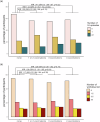Association of SARS-CoV-2 vaccination status with risk of influenza-like illness and loss of workdays in healthcare workers
- PMID: 40783603
- PMCID: PMC12335509
- DOI: 10.1038/s43856-025-01046-8
Association of SARS-CoV-2 vaccination status with risk of influenza-like illness and loss of workdays in healthcare workers
Abstract
Background: In the post-pandemic phase, the value of annual SARS-CoV-2 booster vaccination in healthcare-workers is unclear. In this multicentre cohort study, we sought to determine the association of SARS-CoV-2 vaccination status and other risk factors with the occurrence of influenza-like respiratory illness and workdays lost due to influenza-like respiratory illness.
Methods: During a period of high SARS-CoV-2 community transmission (November 2023 to May 2024), we collected weekly data on symptoms and sick day leave and used negative binomial regression to identify risk factors for these outcomes among 1745 healthcare workers. To single out the effect of the vaccine and account for potential confounding, additional inverse probability weighted analysis was performed.
Results: In both analyses, we show that more SARS-CoV-2 vaccinations are associated with a higher risk of influenza-like respiratory illness and workdays lost. For influenza-like respiratory illness, the association is stronger with a more recent timing of the vaccination rather than the number of vaccinations, which suggests that the effect wanes over time. In contrast, seasonal influenza vaccination is associated with a decreased risk for both outcomes.
Conclusions: Based on our data, we conclude that SARS-CoV-2 booster vaccination does not contribute to the protection of the healthcare workforce in a post-pandemic setting. SARS-CoV-2 vaccination may even temporarily increase the likelihood of symptomatic infection and workday loss.
Plain language summary
In the years following the COVID-19 pandemic, it is still unclear whether annual COVID booster vaccines are necessary for low-risk populations such as healthcare workers. In this study, 1745 healthcare workers in Switzerland were followed over several months to see how their vaccination status affected their chances of getting flu-like illnesses and missing work. The study found that those who recently received a COVID-19 booster were more likely to report symptoms and take sick leave. In contrast, people who received the seasonal flu vaccine were less likely to report symptoms or miss work. These findings suggest that COVID-19 boosters may not offer clear short-term benefits in a post-pandemic setting, and may even increase short-term illness risk. This raises questions about the best use of booster vaccines moving forward.
© 2025. The Author(s).
Conflict of interest statement
Competing interests: The authors declare no competing interests. Ethics: The study was approved by the Ethics Committee of Eastern Switzerland (#2020–00502).
Figures


References
-
- World Health Organization. WHO SAGE Roadmap for prioritizing uses of COVID-19 vaccines. https://www.who.int/publications/i/item/WHO-2019-nCoV-Vaccines-SAGE-Prio... (2023).
-
- Swiss Federal Office of Public Health (FOPH). Guidelines and Recommendations for Covid-19 vaccination [German]. https://backend.bag.admin.ch/fileservice/sdweb-docs-prod-bagadminch-file... (2023).
Grants and funding
LinkOut - more resources
Full Text Sources
Miscellaneous

